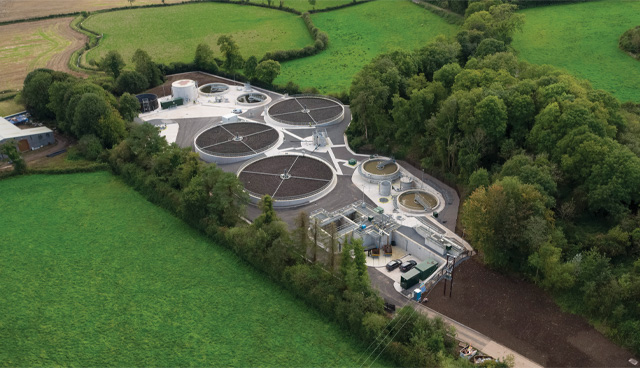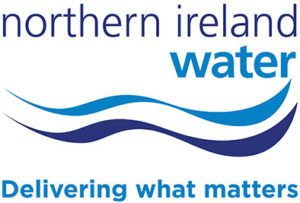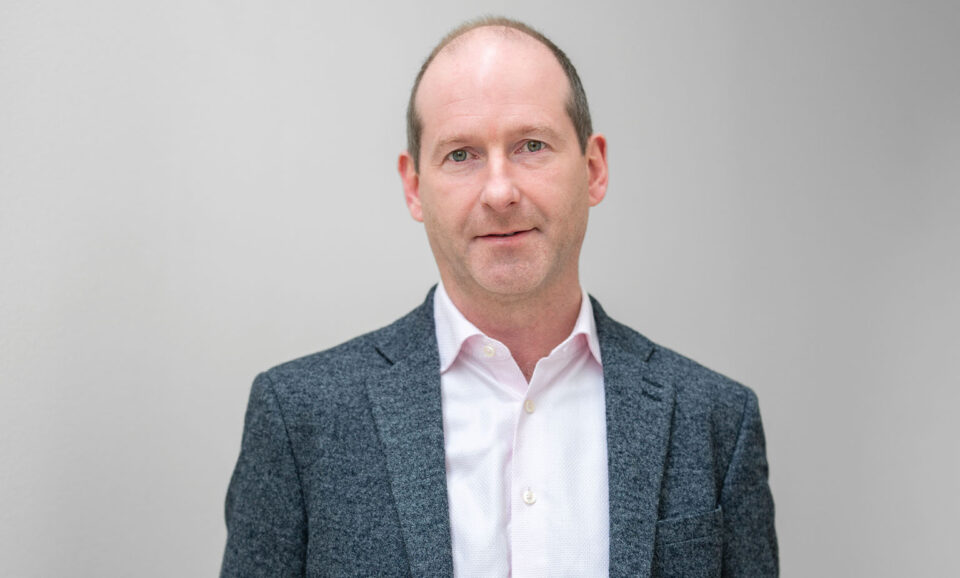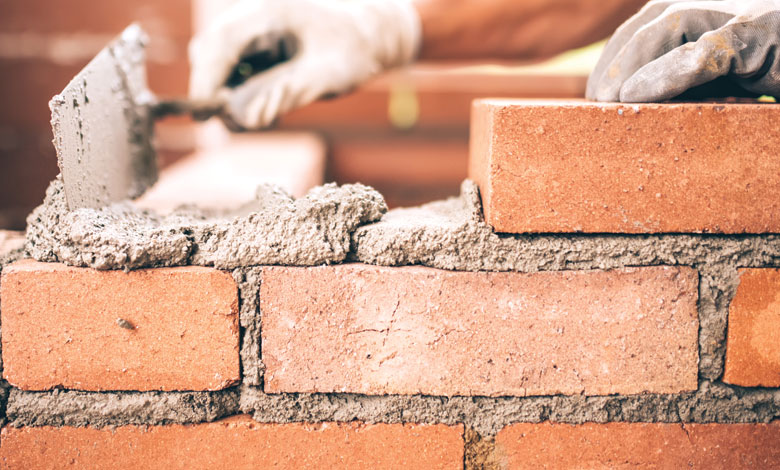
Homelessness crisis
7th June 2021
Building for the future
7th June 2021Poo-power and green gas could supply our future heating needs
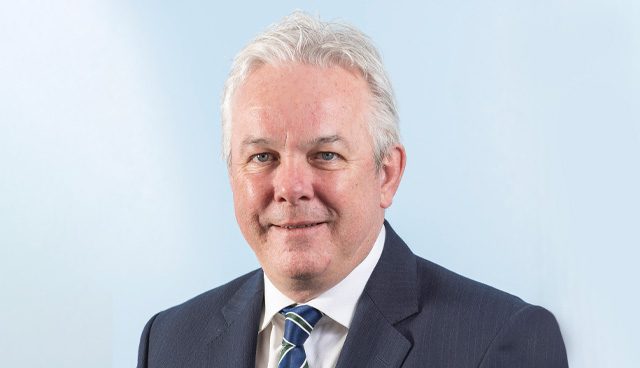
Alistair Jinks, Director of Business Services at NI Water.
Director of Business Services at NI Water, Alistair Jinks, outlines the organisation’s pride at being one of the leading public bodies pushing forward innovative solutions to address the climate emergency.
As the biggest user of electricity and the second largest landowner, NI Water is uniquely placed to harness its assets for a wide range of environmental initiatives.
Whilst NI Water’s drives to provide customers with high quality water and wastewater services, the company is acutely aware of its broader leadership responsibilities as a custodian of nature. The utility has invested significantly in renewable energy sources and its extensive asset base has the potential to help society become self-sufficient in low-cost green energy.
Alistair Jinks, Director of Business Services, NI Water explains: “We recognise that as we emerge from the health pandemic, there is a once in a lifetime opportunity to address recovery by resetting our economy for green growth, to decarbonise and deliver sustainable prosperity. To provide green power for the increasing adoption of electric vehicles and to start to decarbonise heating for homes and places of work, Northern Ireland needs to double its renewable generating capacity in the next 10 years. That means thinking to the future and planning with that in mind, indeed it means making things happen now so that we are ready.”
Transport accounts for around a quarter1 of our harmful climate emissions in Northern Ireland, and with the UK Government’s commitment to phase out fossil fuel vehicles in 2030, there is an expectation that electric vehicles (EVs) will quickly become common place in our every-day lives.
Cue then for NI Water to unveil progress in this area, as its first electric vans enter operation.
NI Water’s fleet of 600 vehicles are a familiar sight to the public, with staff providing an essential 24/7 service, 365 days a year, to all areas of Northern Ireland.
Jinks continues: “A reliable, efficient fleet is vital for NI Water staff to deliver essential water and wastewater services for the community. Given NI Water’s commitment to health, environment and the economy, our use of alternative fuel vehicles is under continual review. With circa 600 light commercial (LCVs) and heavy goods vehicles (HGVs), NI Water recognises in particular the importance of decarbonising our fleet.
“Ahead of the ban on the sale of many new petrol and diesel vehicles, we have been actively considering how, when and where to upgrade to the various forms of alternative fuel technology. It is exciting to see the tangible impact of that work in the form of the first delivery of four new eNV200 vehicles from Nissan.”
For Northern Ireland to play its part in achieving Net-Zero by 2050, NI Water faces a number of challenges. One challenge where good progress has been made is in decarbonising the company’s use of electricity, with over 40 per cent in 2020/21 being generated by renewable sources.
It’s a good start, but as Jinks explains: “We have a wider responsibility to help to ensure that Northern Ireland’s green electricity is affordable. High costs lower everyone’s standard of living and adversely impacts our economy. Decarbonisation presents us with a once in a lifetime opportunity that we must grasp to create green growth.”
One way to lower costs is to put NI Water’s assets to use in helping to supply affordable electricity. In the next 10 years Northern Ireland’s renewable generating capacity will need to double but the existing system infrastructure is not capable of supplying this requirement. To avoid unaffordable strengthening, the electricity system will need new and much greater flexibility to be provided by innovative solutions that are designed to help keep customer bills down.
Jinks adds: “NI Water already has resources that are connected to the electricity network, such as standby generators. With the demand for flexibility increasing significantly, NI Water is deciding how other assets may play a role, such as advanced electrolysers and large-scale batteries. Digital technology also means that existing assets, such as our pumps, can also play an important role.”
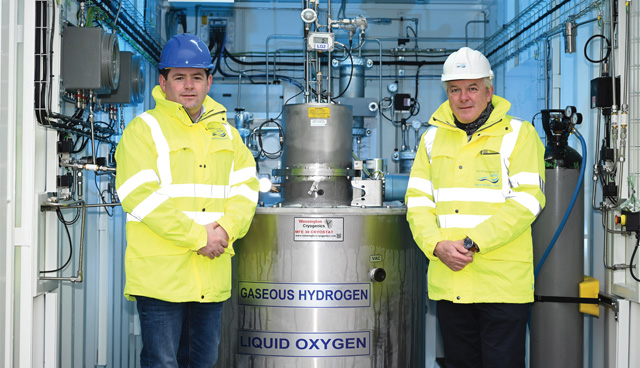
Alistair Jinks, Director of Business Services and Damien O’Mullan, Head of Energy at NI Water with a small-scale electrolyser on site at Kinnegar Wastewater Treatment Works.
NI Water is unique in that it has over 3,000 widely distributed grid connected sites with substantial numbers of assets that will be increasingly relevant in providing electricity network flexibility. For example, many hundreds of large pumps are operating across the province to deliver water and wastewater services. Today, these operate without factoring if customer demand for electricity is high or low but in the future this could be very different. The Intelligent Operations Control Centre at NI Water is developing the capability to flex the company’s energy consumption at distribution level. The aim is for NI Water to use less power in peak demand periods so that more electricity can be supplied to customers who need it, leaving NI Water to ramp up activity at other times. By using existing assets in this way, costs for electricity and water customers can be lower.
NI Water’s capability to help Northern Ireland to become self-sufficient in low-cost renewable energy is increasingly being recognised by senior stakeholders in government.
“Poo-power may be another opportunity,” explains Jinks. “The decarbonisation timescale we are operating to, does not allow us to harness and supply enough renewable electricity to decarbonise all of our energy needs by 2050. We are going to need to change to conserve energy and stop wasting it. Our sewage system could provide an important part of the answer.”
Thanks to things like showers and washing machines, the average temperature of wastewater that runs through the sewers beneath our feet is 15 degrees. This energy can be captured to create sustainable, low carbon heat.
The heat found in wastewater is harnessed via a heat exchanger to transfer it to the clean water network using a closed loop. A heat pump then increases the temperature of the clean water, which in turn provides heating and warm water to buildings. District heating schemes based on ‘poo-power’ for housing or town centre buildings could very well be part of our future.
Green gas could also be key. Jinks adds: “Whilst the primary focus for NI Water in deploying electrolysis at its Belfast Renewable Resource Hub is to produce oxygen to improve treatment processes as well as green hydrogen, a gas that can help to decarbonise its vehicle fleet, the surplus heat created by the electrolysis process could also supply district heating schemes.”
Indeed, green hydrogen may also have a growing role in supplying the gas grid as it seeks to decarbonise. Time will tell, but the decarbonisation clock is ticking and Northern Ireland needs to be ready.
“We all have to act to tackle the climate emergency. NI Water has an ambitious strategy to play its part. Poo-power and green gas might just prove to be an important part of it,” Jinks concludes.
NI Water
W: www.niwater.com
1. https://www.daera-ni.gov.uk/news/northern-ireland-greenhouse-gas-inventory-1990-2017-released

